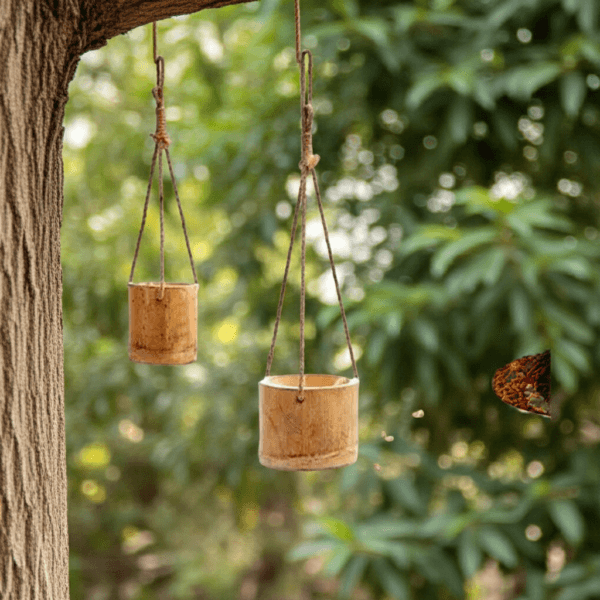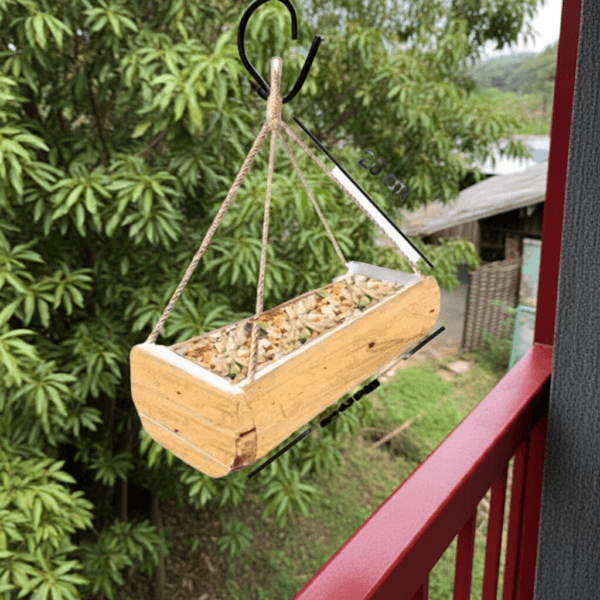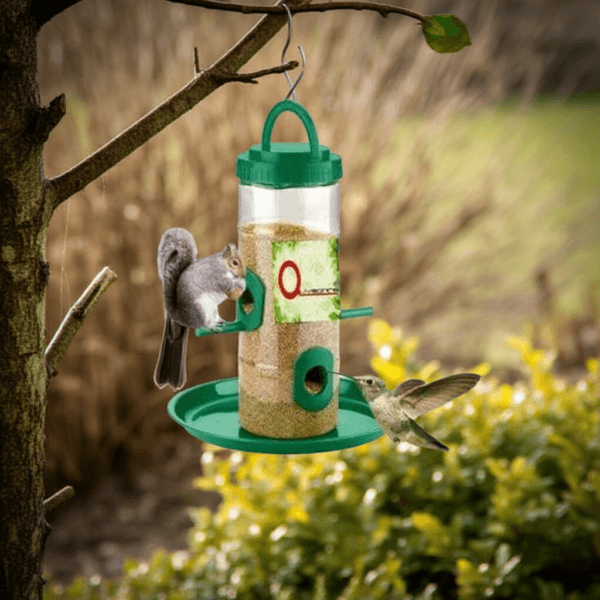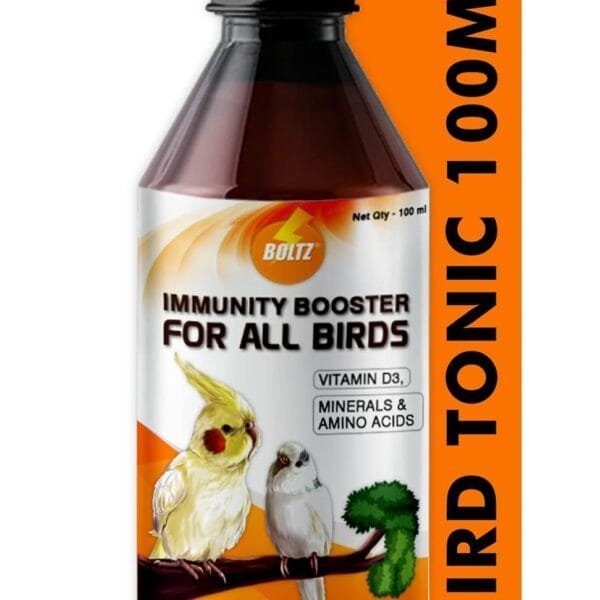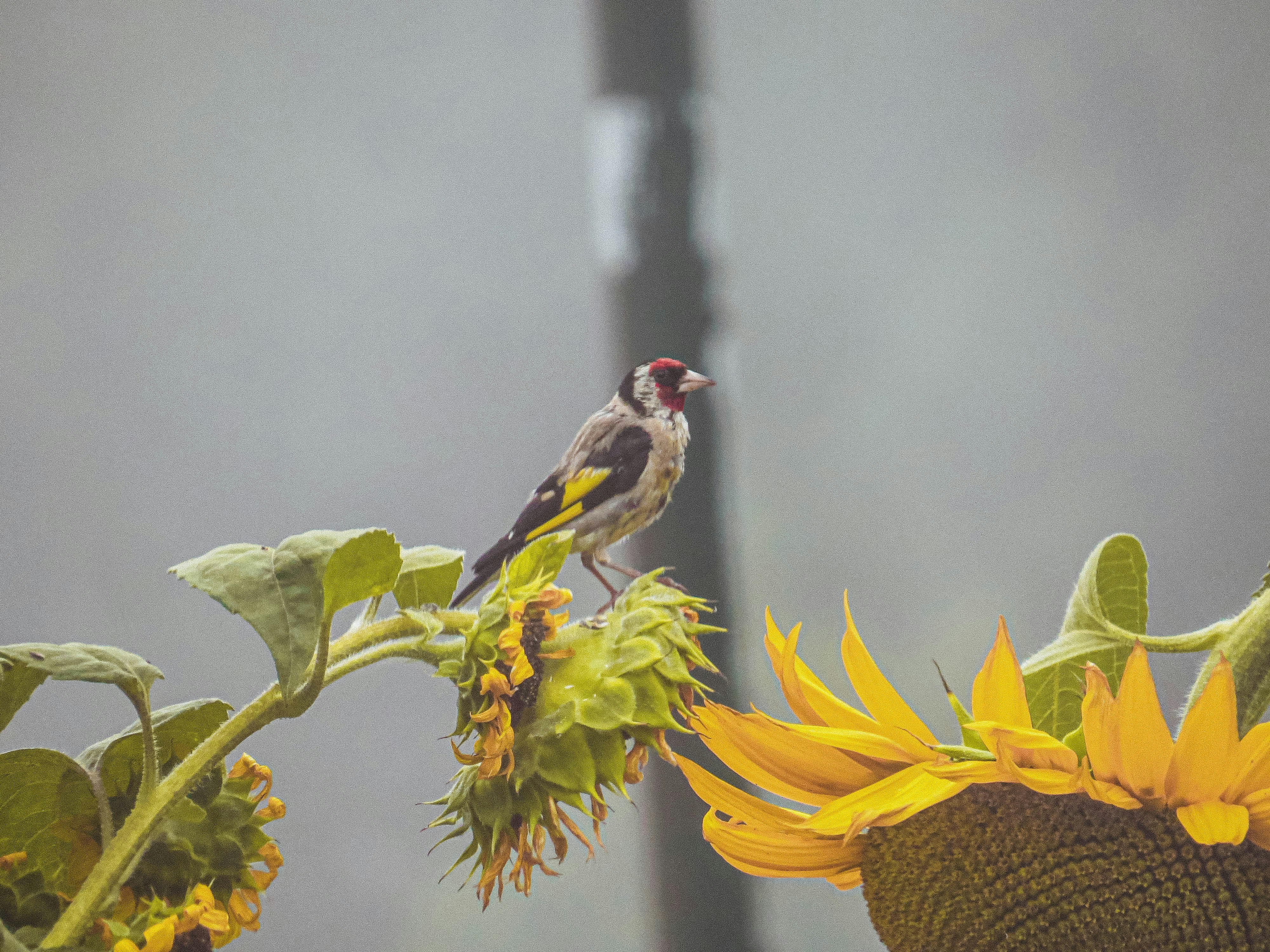
Introduction to Sunflower Seeds
Sunflower seeds have emerged as one of the most popular choices for bird food among avian enthusiasts and casual bird watchers alike. Their significant appeal stems not only from their high nutritional value but also from their versatility, making them suitable for a wide range of bird species. The rich oil content in sunflower seeds provides essential fatty acids, while their protein content supports overall bird health, energy, and growth.
When feeding birds, sunflower seeds serve as a delightful and beneficial addition to their diets. Various species, including finches, chickadees, sparrows, and cardinals, are particularly drawn to these seeds. This affinity highlights the importance of incorporating sunflower seeds into bird feeding practices to attract and sustain diverse bird populations in gardens and rural settings.
Besides serving as a food source, sunflower seeds play a crucial role in the broader context of gardening and bird feeding. They can be easily incorporated into feeding stations or scattered across the ground in a bird-friendly garden. Moreover, understanding the types of sunflower seeds available—such as black oil sunflower seeds, striped sunflower seeds, and dehulled sunflower seeds—can enhance the experience of both gardeners and birds. Each type offers distinct advantages in terms of accessibility, ease of feeding, and nutritional content. By selecting the appropriate seed variety, one can cater to the needs of specific bird species while promoting a thriving ecosystem.
In conclusion, sunflower seeds are not only a practical choice for feeding birds but also an integral component of bird gardening. Their nutritional benefits and appeal to a variety of bird species make them indispensable in successful bird feeding strategies. Understanding the different types of sunflower seeds available can further enrich both the feeding experience and the natural environment in which these birds thrive.
Nutritional Value of Sunflower Seeds for Birds
Sunflower seeds are a favored food source among various bird species, primarily due to their rich nutritional profile. These seeds are an excellent source of essential fats, high-quality protein, vitamins, and minerals. The significant lipid content of sunflower seeds, particularly from the non-hulled varieties, provides birds with the energy they need for their daily activities, especially during the breeding season and migration periods. The ratio of fats to protein in sunflower seeds is particularly beneficial, as it supports energy-intensive behaviors such as flight and foraging.
One key vitamin found in sunflower seeds is vitamin E, an antioxidant that is vital for maintaining overall health in birds. This vitamin supports immune function and aids in the prevention of diseases. Additionally, sunflower seeds are rich in B vitamins, including niacin and thiamine, which are crucial for metabolic processes and energy production. The various minerals present, such as magnesium, calcium, and phosphorus, also contribute to bone health and muscular function, ensuring that birds remain active and agile.
Different bird species, especially those in temperate regions, particularly thrive on sunflower seeds. Cardinals, finches, and blue jays are known to be fond of these seeds, often choosing them over other food options due to the palatable taste and dense nutrient composition. Birds with larger bills, such as the evening grosbeak, can easily crack open the hard shells to access the nutrient-rich kernels inside. Therefore, providing sunflower seeds as a part of a bird’s diet can greatly enhance their energy levels, support growth and development, and contribute to their overall well-being, making these seeds an ideal choice for bird feeders.
Types of Sunflower Seeds for Bird Feeding
Sunflower seeds are an excellent bird feeding option, providing essential nutrients and attracting a wide variety of avian species. Understanding the different types of sunflower seeds available can enhance your bird feeding experience and ensure you choose the best option for your feathered friends. The three most common types of sunflower seeds are black oil sunflower seeds, striped sunflower seeds, and hulled sunflower seeds.
Black oil sunflower seeds are highly favored by many birds due to their high fat content and nutritional value. These seeds have thin shells, making it easier for birds to access the nutritious seed within. Species such as cardinals, chickadees, finches, and nuthatches are particularly drawn to these seeds. Apart from providing energy, black oil sunflower seeds are also known for their high protein content, making them a suitable choice for birds, especially during breeding seasons when they require additional nutrition.
Striped sunflower seeds, distinguished by their thicker shells and striped outer appearance, are another popular choice for bird feeders. While they also offer some nutritional benefits, they are generally less favored by birds compared to their black oil counterparts due to the difficulty of cracking open the shell. However, larger birds such as woodpeckers, jays, and some species of finches may still enjoy striped seeds. For those looking to attract larger birds, offering striped sunflower seeds can be a beneficial option.
Hulled sunflower seeds, which have had their shells removed, are convenient and ensure no mess in your feeding area. They can be particularly appealing to birds that may have difficulty cracking hard shells. Species such as finches, sparrows, and even ground-feeding birds find hulled sunflower seeds irresistible. Furthermore, these seeds can be incorporated into seed mixes or offered in feeders designed specifically for hulled seeds, appealing to a broader array of bird species.
Best Bird Species That Enjoy Sunflower Seeds
Sunflower seeds are an exceptional source of sustenance for many bird species, making them a popular choice among avian enthusiasts. Various backyard birds are drawn to these seeds, not only for their nutritional value but also for their versatility in different feeding setups. One of the most prominent groups of birds that favor sunflower seeds includes the finches. Species such as the American Goldfinch and House Finch exhibit a distinctive preference for the oil-rich content of sunflower seeds, particularly the black oil type. Their slender beaks make it easy for them to crack open the shells, allowing for quick access to the nutritious inner seeds.
Another bird often seen foraging for sunflower seeds is the Northern Cardinal. These vibrant birds are attracted to the seeds due to their high fat content, which provides ample energy, especially during cold weather. Cardinals typically prefer sunflower seeds in platform feeders or scattered on the ground, where they can easily spot and retrieve them. Furthermore, they often exhibit a shy behavior but will return if they feel safe within their habitat.
Chickadees, including the Black-capped Chickadee, also have a deep appreciation for sunflower seeds. Known for their curious nature, these small birds possess a unique feeding technique where they often take seeds to a safe perch before consuming them. They display a remarkable ability to crack open a variety of seeds, including sunflower seeds, which are crucial for their diet.
In addition to these popular species, many other birds including jays, sparrows, and doves also enjoy sunflower seeds. By incorporating sunflower seeds into your bird feeding strategy, you can attract a diverse range of feathered visitors, enhancing your backyard experience while supporting local wildlife.
-
Bamboo Bird Feeder
Original price was: Rs.139.00.Rs.129.00Current price is: Rs.129.00. -
Bamboo Bird Feeder
Original price was: Rs.199.00.Rs.149.00Current price is: Rs.149.00. -
Bird Feeder Plastic
Original price was: Rs.150.00.Rs.110.00Current price is: Rs.110.00. -
BOLTZ Avian Immunity Booster – Essential Vitamins & Amino Acids for Parrots, Budgies & Finches (100ml)
Original price was: Rs.349.00.Rs.299.00Current price is: Rs.299.00.
How to Offer Sunflower Seeds to Birds
Feeding sunflower seeds to birds can be a rewarding experience, providing essential nutrition while allowing enthusiasts to enjoy the beauty of avian visitors. There are several methods to offer sunflower seeds, each with its advantages and disadvantages, making it crucial for bird lovers to choose the best option for their feeding stations.
One of the most popular methods is using bird feeders specifically designed for sunflower seeds. These feeders come in various styles, such as tube feeders, platform feeders, and hopper feeders. Tube feeders are particularly effective, as they often have small perches that attract smaller birds, while larger hopper feeders can accommodate multiple species. The advantages of using feeders include minimizing seed waste and preventing squirrels and pests from accessing the seeds. However, it is essential to clean feeders regularly to prevent mold and ensure the health of visiting birds.
Another option is ground feeding, where sunflower seeds are scattered directly on the ground. This method can be appealing to ground-feeding species such as doves and jays. While this approach allows for a natural feeding experience, it also has its drawbacks. Seed waste is more common, and ground feeding may attract unwanted pests like rodents. To mitigate these issues, consider using platforms or trays to contain the seeds.
For those interested in a DIY solution, homemade bird feeders can be an enjoyable project. Simple designs can be made using pine cones, peanut butter, and sunflower seeds, allowing for customization and creativity. DIY feeders not only save on costs but also provide a way to engage children and promote an appreciation for wildlife. However, ensure that any materials used are safe and non-toxic for birds.
In conclusion, whether you choose feeders, ground feeding, or DIY options, offering sunflower seeds to birds can enhance your outdoor space and foster a deeper connection with nature. Select the method that works best for your environment and the bird species you wish to attract.
Seasonal Considerations for Feeding Birds Sunflower Seeds
Bird feeding is a rewarding activity that changes with the seasons, requiring careful consideration of the types of seeds offered and the conditions present in each season. Sunflower seeds serve as an excellent food source for many bird species, especially during winter and the nesting season. In winter, harsh weather conditions prompt birds to seek reliable food sources. Sunflower seeds, rich in oils and nutrients, provide essential energy that helps birds endure the cold. Moreover, the seeds are highly appealing to many woodland species, including cardinals, finches, and chickadees, making them a perfect choice for winter feeding.
To maximize the benefits of sunflower seeds during this season, it is crucial to maintain clean and well-stocked feeders. Regularly checking for seed quality is important, as old or damp seeds can deter birds and even contribute to health issues. Ideally, feeders should be filled with fresh seeds to entice birds continuously. Consider using seed trays or platforms to mitigate waste, as spilled seeds can attract unwanted pests.
As spring approaches, the nesting season presents another opportunity for incorporating sunflower seeds into feeding routines. Birds require additional nutrition to support their breeding and rearing of young. Offering sunflower seeds can aid in their energy demands, particularly during the weeks leading up to and following the hatching period. Placing feeders near nesting sites can encourage birds to visit frequently, contributing to their foraging behavior.
Throughout the changing seasons, it is imperative to adjust feeder locations, types, and even the timing of feeding. Observing local bird activity can provide insights into their preferences and seasonal shifts. By providing a consistent source of sunflower seeds, bird enthusiasts can support avian populations year-round while enjoying the enriching experience of birdwatching.
Common Pests and Problems When Feeding Birds
When it comes to providing sunflower seeds as bird food, enthusiasts often encounter several challenges. Among these challenges are the issues posed by pest birds, squirrels, and moldy seeds. Recognizing and addressing these problems is crucial for ensuring a safe and nutritious feeding environment for songbirds.
Pest birds, such as starlings and house sparrows, can monopolize feeding stations, driving away desirable species. These opportunistic feeders are attracted to readily available sunflower seeds, and their overwhelming presence can discourage other birds from visiting. To mitigate this issue, bird lovers might consider using feeders designed specifically for certain species, featuring exclusive feeding ports that allow only smaller birds to access the seeds. This selective approach not only minimizes competition but also ensures that the intended avian guests have uninterrupted access to sunflower seeds.
Squirrels, notorious for raiding bird feeders, pose another challenge. Their agility allows them to reach feeders, often consuming a significant portion of the offered seeds. Implementing squirrel-proof feeders or using baffles can help deter these inquisitive rodents. Additionally, placing feeders on poles away from climbing surfaces can further hinder their access, allowing birds to enjoy sunflower seeds without interference.
Another significant problem arises from moldy seeds. Sunflower seeds, like many organic products, can develop mold if they are stored improperly or exposed to moisture. Moldy seeds can be harmful to birds, causing health issues if ingested. To prevent this, it is essential to regularly clean feeders and ensure seeds are kept in a dry, cool location. Replacing old seeds with fresh ones is also recommended, as this enhances the overall quality of the bird food offered. Proper storage and regular maintenance can greatly enhance the effectiveness of sunflower seeds as bird food, leading to a happier, healthier birdwatching experience.
DIY Sunflower Seed Recipes for Backyard Birds
Creating homemade bird treats using sunflower seeds is a rewarding way to attract a variety of birds to your backyard. Simplistic and enjoyable, these recipes allow bird enthusiasts to easily prepare nutritious snacks that will delight feathered visitors. Here are a few straightforward recipes incorporating sunflower seeds that you can try.
Seed Cakes: To make a seed cake, combine 1 cup of sunflower seeds with 1 cup of cornmeal and 1 cup of flour. Add 2 tablespoons of sugar and 1 cup of water to the mixture, stirring until well combined. Pour the batter into a loaf pan or mold and place it in the freezer until solid. Once set, you can hang it outside using a string or twine. This cake serves as a high-energy treat that will surely attract an array of birds such as finches and chickadees.
Suet Balls: Suet balls are an excellent source of fat for birds during the colder months. To make them, melt 1 cup of lard or vegetable shortening and mix in 2 cups of sunflower seeds along with 1 cup of oats. For added nutrition, consider adding dried fruits or mealworms. Roll the mixture into balls and allow them to cool before hanging them in mesh bags or placing them in a suet feeder. These high-calorie treats provide birds with the necessary energy to thrive in chilly temperatures.
Bird Seed Mix: A custom birdseed mix can easily be made at home by combining 2 cups of sunflower seeds, 1 cup of millet, and 1 cup of cracked corn. Store this mixture in a sealed container, and you can refill your feeders as needed. The combination of sunflower seeds, rich in oils, with other seeds will attract a diverse range of birds and encourage regular visits to your backyard.
By implementing these simple DIY recipes, birdwatchers can enhance their feeding practices. Not only do homemade treats provide essential nutrients, but they also encourage birds to return to your yard, creating opportunities for joyful observation and interaction.
Conclusion
In conclusion, sunflower seeds have emerged as a premium choice for bird feeding, proving to be invaluable in attracting a varied array of bird species. Their high nutritional content, accompanied by their palatability, makes them particularly favorable among both backyard bird enthusiasts and avian communities alike. By incorporating sunflower seeds into bird feeders, individuals can enhance the diversity of birds visiting their outdoor spaces, thus enriching the overall birdwatching experience.
Across the discussion, we explored the various advantages of using sunflower seeds, including their rich content of proteins and fats that are crucial for birds, especially during breeding and migratory periods. The seeds appeal to many bird species, from songbirds to larger ones like woodpeckers, showcasing the versatility of sunflower seeds in catering to different avian preferences. Additionally, various forms, such as whole seeds and striped varieties, present options for bird enthusiasts to attract a broader selection of wildlife.
Embracing sunflower seeds as a core offering in your bird feeding practices can significantly contribute to local ecosystems and foster greater connections with nature. By providing these seeds regularly, bird watchers can create a more hospitable environment that encourages diverse bird populations to thrive, ultimately enhancing one’s enjoyment and satisfaction in backyard birdwatching. Through the simple act of filling feeders with sunflower seeds, enthusiasts can cultivate a space brimming with life and color, filled with delightful chirps and flutters of feathers. It is an invitation to engage with nature while enjoying the fascinating behaviors and interactions of birds in our vicinity.
Are sunflower seeds healthy for birds?
In moderation, yes! They provide healthy fats, protein, and vitamin E, but excessive consumption leads to obesity and nutrient imbalances.
What’s the difference between black oil & striped sunflower seeds?
Black oil seeds: Higher fat content, softer shell (easier for small birds to crack).
Striped seeds: Larger, thicker shell, slightly lower fat (preferred by larger birds like parrots).
How many sunflower seeds can I safely feed my bird daily?
Small birds (finches, budgies): 1–2 seeds/day.
Medium/Large birds (cockatiels, parrots): 3–5 seeds/day (as treats, not staple food).
Can sunflower seeds cause health problems?
Yes, overfeeding risks:
Obesity & fatty liver disease (high-fat content).
Vitamin deficiencies (if seeds replace balanced pellets/veggies).
Should I feed shelled or unshelled sunflower seeds?
Unshelled: Encourages natural foraging behavior.
Shelled: Less mess but monitor intake (birds may overeat).
Are roasted/salted sunflower seeds safe?
No! Avoid salted, flavored, or roasted seeds—stick to raw, unsalted varieties.
Do sunflower seeds attract wild birds to feeders?
Yes! Loved by cardinals, chickadees, and finches. Use sparingly to avoid dependency.
Can sunflower seeds go bad?
Yes! Rancid seeds smell musty. Store in an airtight container in a cool, dark place for up to 6 months.
Are sprouted sunflower seeds healthier?
Yes! Sprouting boosts digestibility and nutrients (enzymes, vitamins). Soak seeds overnight, then rinse daily until sprouts form.
How do I transition my seed-addicted bird to a healthier diet?
Mix seeds with pellets/chopped veggies, gradually reducing seeds.
Use seeds as training rewards only.

